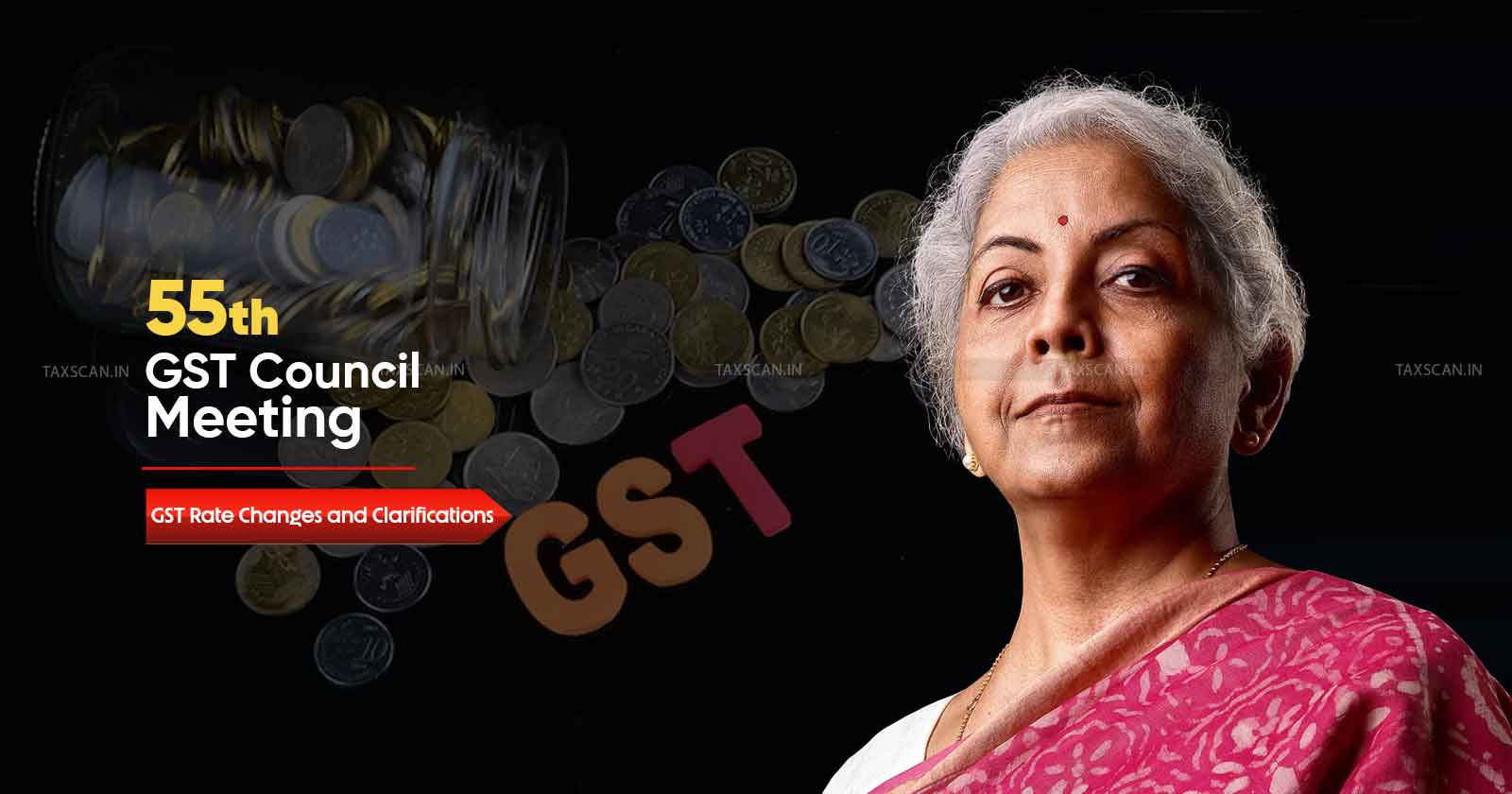55th GST Council Meeting: Major GST Rate Changes and Clarifications
55th GST Council Meeting Brings Comprehensive Rate Changes and Key Clarifications

In a decisive move aimed at refining India’s indirect tax framework, the 55th Goods and Services Tax (GST) Council convened recently under the chairmanship of the Union Finance Minister, Nirmala Sitharman at Jaisalmer, Rajasthan.
The GST Council recommendations encompass a spectrum of changes in GST rates on goods and services, extension of exemptions, and crucial clarifications on several long standing ambiguities.
Below is a detailed overview of the major developments that have emerged from this important meeting.
Rate Reductions and Exemptions on Goods
One of the standout announcements is the reduction of the GST rate on Fortified Rice Kernel (FRK) from its existing slab to 5%. This move is expected to bolster the government’s nutrition-centric initiatives and make fortified foods more accessible to the masses. Another important exemption granted is on gene therapy, reflecting the government’s focus on supporting critical and emerging healthcare treatments.
Further, the Council has decided to extend the IGST exemption to systems, sub-systems, equipment, parts, sub-parts, tools, test equipment, and software used in the assembly or manufacture of LRSAM (Long Range Surface-to-Air Missile) systems. This extension falls under Notification 19/2019 Customs, potentially reducing the overall cost of defense procurement.
In another bid to support exporters, the GST Council recommended lowering the Compensation Cess to 0.1% on supplies intended for merchant exporters, keeping it in line with the GST rates for similar exports. Additionally, the Council has exempted from IGST the import of all equipment and consumable samples by Inspection Teams of the International Atomic Energy Agency (IAEA), subject to certain conditions, promoting international cooperation in nuclear energy.
The meeting also brought continuity to the concessional 5% GST rate on select food inputs (falling under HSN 19 or 21) supplied for free distribution to economically weaker sections under government programs. This extension keeps essential food items more affordable for charitable and welfare activities.
Service Sector: GST Rate Changes and Clarifications
Turning to services, one of the more notable changes is the introduction of Forward Charge Mechanism on sponsorship services provided by corporate entities, effectively shifting the tax liability to the service provider. Moreover, the Council exempted from GST the contributions made by general insurance companies to the Motor Vehicle Accident Fund—an initiative designed to offer compensation and cashless treatment for road accident victims, including hit-and-run cases.
In a boost to the hospitality industry, the definition of declared tariff has been omitted, and the definition of specified premises has been recalibrated to link it with the actual value of supply. From April 1, 2025, if the value of supply for hotel accommodation in the preceding financial year exceeds INR 7,500, it will attract Goods and Services Tax (GST) at 18% (with Input Tax Credit). Otherwise, a 5% GST (without ITC) will apply. Additionally, hotels may opt to pay 18% GST with ITC by submitting a declaration at the beginning of the financial year.
For simplicity in compliance, taxpayers registered under the composition levy scheme have been excluded from the reverse charge mechanism on renting of commercial or immovable property. The period from October 10, 2024, until the issuance of the new notification is to be regularized on an “as is where is” basis.
Other Notable Amendments and Clarifications
In what may significantly impact the automobile resale market, the GST Council raised the GST rate from 12% to 18% on the sale of all old and used vehicles—both electric and conventional—except those already specified at 18%. Importantly, GST will only apply on the margin, or the difference between purchase and selling price, ensuring that smaller dealers are not unduly burdened.
Addressing classification nuances, the Council clarified that Autoclaved Aerated Concrete (ACC) blocks containing more than 50% fly ash will fall under HS 6815 and attract 12% GST. Pepper (whether fresh or dried) and raisins, when supplied by an agriculturist, have been deemed exempt from GST altogether.
Moving to pre-packaged and labelled goods, the definition has been amended to include commodities up to 25 kilograms or 25 litres that are required to bear declarations under the Legal Metrology Act. Meanwhile, ready-to-eat popcorn salted or spiced will be taxed at 5% if supplied loose and 12% if pre-packaged and labelled; however, caramel or sugar-based popcorn will attract 18%.
Another welcome clarification concerns Payment Aggregators regulated by the Reserve Bank of India (RBI), which have been deemed eligible for existing tax exemptions that apply to acquiring banks. This does not, however, extend to payment gateways or fintech services that do not involve settlement of funds.
Additionally, penal charges levied by banks and NBFCs on borrowers for non-compliance with loan terms have been confirmed as non-taxable under GST.
Overall, the 55th GST Council Meeting marks a step forward in refining India’s GST landscape. By reducing complexities, offering precise classifications, and ensuring fair taxation across goods and services, the Council demonstrates its commitment to a more streamlined, equitable indirect tax framework.
As businesses and consumers absorb these changes, the updated GST regime has greater clarity, compliance, and confidence across the market.
Support our journalism by subscribing to Taxscan premium. Follow us on Telegram for quick updates


